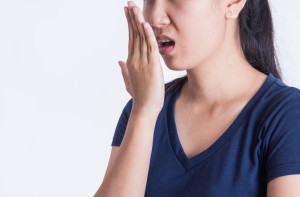 If you’ve grown tired of articles that talk about brushing and flossing more, so you have bad breath less, you’ve come to the right place. We’ve compiled a short list of three simple things you probably aren’t doing that can prevent bad breath.
If you’ve grown tired of articles that talk about brushing and flossing more, so you have bad breath less, you’ve come to the right place. We’ve compiled a short list of three simple things you probably aren’t doing that can prevent bad breath.
Hydrate—Drink more water
The most common cause of bad breath is bacterial buildup in the mouth, any part of the mouth, including your tongue. So chances are you’ve already tried more thorough and more regular brushing and flossing. And if you haven’t done so yet, you’ll probably purchase a tongue scraper to help keep bad odor away, too. Those ideas are absolutely fine, but they are ways of removing the bacteria that has already built up. A matter of maintenance, not a preventive solution. So, we submit to you the power of spit, or in more medically correct terms, saliva.
Saliva is a natural bacteria killer. That means, if you can produce enough of it, bacteria doesn’t have time to build up in your mouth and cause stench. The number one way to produce saliva is to drink plenty of water during the day and before bedtime. And if you are deciding between using mints or gum to cover your bad breath, choose gum. That’s because the chewing action will make your mouth salivate far more than sucking on a mint.
Keeping a glass of water next to your bed at night is also a good idea, especially if you snore. Snoring dries out the mouth significantly and allows bacteria to fester there during the night. If you can manage to wake yourself up a couple times each night and imbibe a glass of water, you may be able to stay one step ahead of bacterial buildup. There’s no substitute for a good night sleep, so only try interval sleeping approach if you find it easy to fall asleep by default.
Diagnose—Go to a doctor
In a nation where healthcare insurance comes at a premium, some folks try to avoid doctor visits. But if your halitosis is severe, you should mention it during your annual physical. Bad breath can be a symptom of a more serious condition as well as a reaction to medication.
Your doctor can help you narrow down the possible cause of your halitosis, and that means potentially he or she could potentially help you mitigate it or solve it permanently, too. Direct and indirect causes of bad breath include, but are not limited to, the following:
- Reaction to medication
- Gastroesophageal reflux disease (acid reflux disease or GERD)
- Sleep apnea
- Allergies
- Sinus infection
- Food sensitivities
Most folks will have less than fresh breath after digesting garlic and onions thanks to sulfur-containing gases that those two foods tell your digestive system to produce. But some folks react to other foods, too. Coffee, alcohol, dairy, and tuna are some common culprits. You can brush and floss and scrape your tongue to mitigate the halitosis, but reducing your intake of these or cutting them out of your diet altogether is going to be the only solution for some.
Counteract—Fight it homeopathically
Probiotics is the fancy term for the bacteria in your digestive system that help you break down your food in a healthy way. Certain foods like yogurt and sauerkraut or drinks like kombucha and kefir increase the good bacteria in your belly, which helps to reduce bad breath.
Some people take it a step further and rinse with hydrogen peroxide, which can kill bacteria and viruses that reside orally. Although it is not a carcinogen as some urban myths suggest, we can’t recommend this halitosis fighting method. Hydrogen peroxide, especially if not diluted enough, can blanch your gums and cause tooth sensitivity.
Consider instead rinsing your mouth with water and apple cider vinegar. Apple cider vinegar contains a high level of both malic and acetic acid, which make it hard for bacteria to thrive. When combined with other low-cost, wholesome products like parsley or baking soda, apple cider vinegar becomes a part medicinal part culinary bad breath cure. Lifehack offers a number of apple cider vinegar recipes for mouthwashes, chews, drinks and edibles that are affordable and homeopathic.
There is no getting around the fact that if you are human, you will at some point stink. But bad breath, especially for anyone with generally good dental hygiene practices, does not have to win out chronically. Follow the three pieces of advice above and you should see—and smell—a significant difference very soon.







Leave a Reply